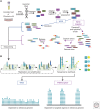Genome-Wide Sequencing for Prenatal Detection of Fetal Single-Gene Disorders
- PMID: 26253094
- PMCID: PMC4588135
- DOI: 10.1101/cshperspect.a023077
Genome-Wide Sequencing for Prenatal Detection of Fetal Single-Gene Disorders
Abstract
New sequencing methods capable of rapidly analyzing the genome at increasing resolution have transformed diagnosis of single-gene or oligogenic genetic disorders in pediatric and adult medicine. Targeted tests, consisting of disease-focused multigene panels and diagnostic exome sequencing to interrogate the sequence of the coding regions of nearly all genes, are now clinically offered when there is suspicion for an undiagnosed genetic disorder or cancer in children and adults. Implementation of diagnostic exome and genome sequencing tests on invasively and noninvasively obtained fetal DNA samples for prenatal genetic diagnosis is also being explored. We predict that they will become more widely integrated into prenatal care in the near future. Providers must prepare for the practical, ethical, and societal dilemmas that accompany the capacity to generate and analyze large amounts of genetic information about the fetus during pregnancy.
Copyright © 2015 Cold Spring Harbor Laboratory Press; all rights reserved.
Figures

References
-
- ACOG. 2013. Committee Opinion No. 581: The use of chromosomal microarray analysis in prenatal diagnosis. Obstet Gynecol 122: 1374–1377. - PubMed
-
- Alamillo CM, Fiddler M, Pergament E. 2012. Increased nuchal translucency in the presence of normal chromosomes: What’s next? Curr Opin Obstet Gynecol 24: 102–108. - PubMed
-
- Atwal PS, Brennan ML, Cox R, Niaki M, Platt J, Homeyer M, Kwan A, Parkin S, Schelley S, Slattery L, et al. 2014. Clinical whole-exome sequencing: Are we there yet? Genet Med 16: 717–719. - PubMed
Publication types
MeSH terms
LinkOut - more resources
Full Text Sources
Other Literature Sources
Medical
